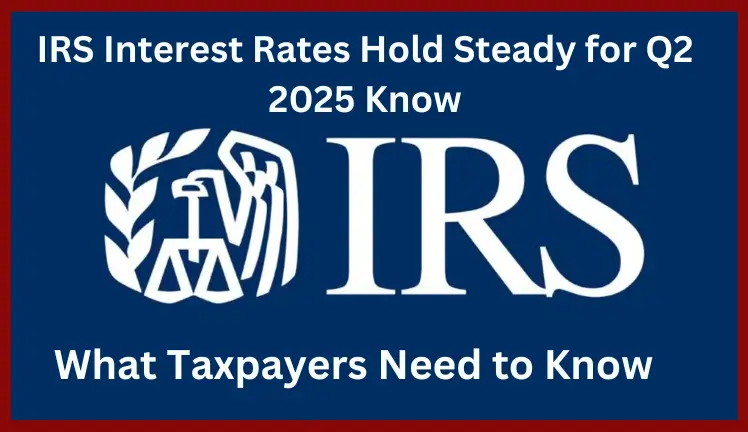IRS Interest Rates: Starting April 1, 2025, the Internal Revenue Service (IRS) will maintain its interest rates at the same level for the second calendar quarter of the year. This decision affects both individual taxpayers and corporations with regard to overpayments and underpayment.

Key Rates for April 1, 2025
- Individuals: Overpayment and underpayment interest rate remains 7%, compounded daily.
- Corporations:
- Overpayments: 6% for standard corporate overpayments.
- Excess Overpayments: 4.5% on the amount exceeding $10,000.
- Underpayments: 7% for standard corporate underpayments.
- Large Corporate Underpayments: 9%.
Read Also:
Is a $330 Child Tax Credit Coming in December 2024? Here’s the Latest
How These Rates Are Determined
Under the Internal Revenue Code, rates are updated quarterly based on the federal short-term rate. The interest rate for individual overpayments and underpayments is the federal short-term rate plus three percentage points. Corporations typically see one percentage point less for overpayments (federal short-term rate plus two), while large corporate underpayments can add up to five percentage points above the short-term rate.
Why It Matters
- Cash Flow Management: Taxpayers with outstanding tax obligations or pending refunds should plan around these interest rates to optimize their financial decisions.
- Corporate Considerations: Large corporate underpayments carry higher rates, emphasizing the importance of accurate tax calculations and timely payments.
- Quarterly Updates: These rates are recalculated every three months, so stay tuned for the next announcement if you have ongoing tax matters.
FAQS Of IRS Interest Rates
- How often are IRS interest rates updated?
Rates are set quarterly, aligning with changes in the federal short-term rate. - What is the federal short-term rate?
It’s a rate determined monthly by the Treasury Department, serving as a benchmark for various interest calculations. - Do individuals and corporations always have different rates?
Generally, yes. Individual overpayment/underpayment rates are one percentage point higher than corporate overpayment rates, while large corporate underpayments carry an even higher rate. - Why is there a separate rate for large corporate underpayments?
The IRS imposes a higher interest rate on substantial underpayments by large corporations to encourage timely and accurate tax payments. - What is considered a ‘large corporate underpayment’?
It typically refers to a significantly higher tax liability owed by corporations, though the exact threshold can vary based on IRS regulations.
Visit IRS Official Website For More Information
Admin at Sirfal.com – Experienced blogger since 2015, sharing Q&A content and latest job updates.